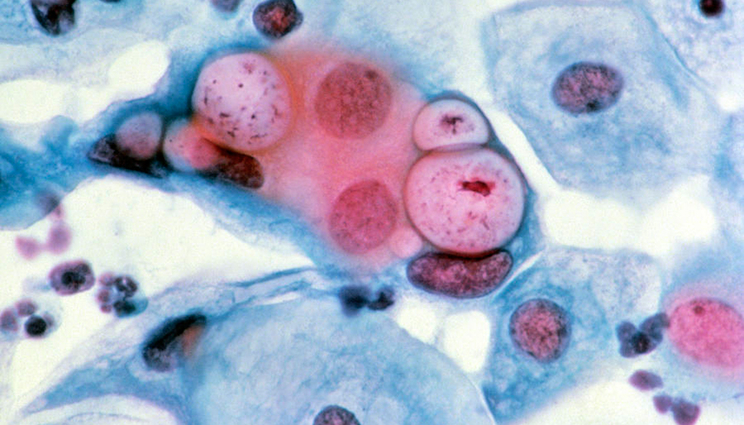Lab team wins National Institutes of Health two-year grant to develop chlamydia vaccine
 (Download Image)
LLNL researchers are working on a chlamydia vaccine. Image courtesy of National Cancer Institute
(Download Image)
LLNL researchers are working on a chlamydia vaccine. Image courtesy of National Cancer Institute
Lawrence Livermore National Laboratory (LLNL), with UC Irvine and Synthetic Genomics, won a two-year $485,000 grant from the National Institutes of Health (NIH) to explore new ways to develop a chlamydia vaccine.
The team’s project, "Synthetic Generation of a chlamydia Vaccine," uses bioengineering to formulate a major outer membrane protein (MOMP) vaccine. This protein has proved effective in preventing the disease in mice and had promising results in non-human primate vaccine studies.
Chlamydia trachomatis is the most common bacterial sexually transmitted infection worldwide, with more than 90 million new cases of the infection each year. Treatment is available. However, antibiotics do not prevent reoccurrences. If the infection is left untreated in women, chlamydia can lead to infertility, ectopic pregnancy and preterm birth, and in newborns conjunctivitis and pneumonia.
While studies have shown MOMP significantly protects against the infection and disease, it has been extremely difficult to produce this type of vaccine because of the protein‘s complex structure. The immune system depends on the amino acids in the protein to fold together correctly, otherwise it cannot create the antibodies and immune cells needed to protect the body.
To overcome its conformational defects, researchers bioengineered a novel MOMP preparation using the Lab’s nanolipoprotein (NLP) technology and paired it with the correct adjuvant.
LLNL principal investigator Matthew Coleman explains: "The NLPs are a supporting scaffold that can solubilize the membrane bound protein so that it is easy to manipulate. The breakthrough was done by combining synthetic biology approaches and cell-free co-expression of MOMP with nanolipoproteins in the presence of lipids."
The vaccine works via the body’s recognition of MOMP as a foreign entity and subsequent activation of the immune system to attack it. Adding agents to the vaccine called adjuvants boosts the immune system’s response to the antigen, and together they create antibodies and immune cells strong enough to defend against infection.
The grant will fund continued development of NLPs formulated with MOMP and subsequent vaccine efficacy studies in mice.
The NIH award is classified as an exploratory/developmental biomedical research grant that provides funding for studies that look to make new discoveries or build upon previous breakthroughs.
The team also includes LLNL researchers Nick Fischer, Amy Rasley, Wei He and Angela Evans.
Other collaborators include Luis de la Maza and his team at UC Irvine and Bolyn Hubby and her team at Synthetic Genomics Inc.
Previous funding was provided by Laboratory Directed Research and Development program and Work for Others (WFO) feasibility funding from Synthetic Genomics.
Contact
Kate Hunts[email protected]
925-422-1322
Related Links
National Institutes of Health ProjectTags
Physical and Life SciencesFeatured Articles







